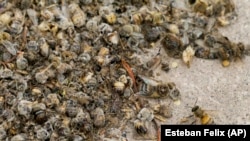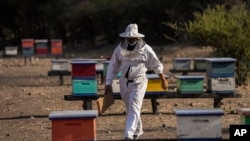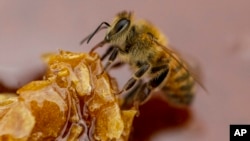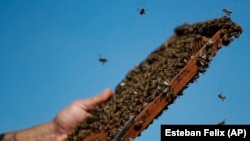The South American nation of Chile has been experiencing a severe drought for the last 13 years. This extreme lack of water has led to fewer flowers and, as a result, fewer honeybees.
Poisonous chemicals used to kill insects harmful to crops, called pesticides, also hurt bees.
Beekeepers in Chile are concerned. Carlos Peralta and his brother Marco are beekeepers. In the central Chilean town of Colina, Carlos has seen the number of his honeybees decrease sharply.
He said he has lost about 300 hives since the start of November 2021. A hive can hold tens of thousands of bees. Losing so many bees left Peralta with a difficult choice. He could keep his remaining 900 hives alive with manufactured nectar, or he could move the hives to a place where there are more flowers.
“If the bees die, we all die...The bee is life,” Carlos said. He was describing the important job that bees have: to pollinate plants in the wild and for food growers. As a major exporter of fruit, successful pollination of fruit trees is important for Chile.
So Carlos decided to move his beehives about 1,000 kilometers to the south, to a place called Puerto Montt. However, his brother Marco chose to stay in Colina with his bees rather than join Carlos in the south. Marco said he feared losing bees to pesticides if he moved.
A expert on biodiversity for Latin America in the United Nations Food and Agriculture Organization (or FAO) is Andrés González.
He identified four problems that are reducing populations of pollinating insects:
- the use of pesticides and fertilizers
- the growing of only one crop in an area
- droughts caused partly by climate change
- and poor use of water
These problems, in addition to parasites, have hurt bee populations around the world.
An FAO study in 2018 found that Chile’s imports of pesticides had grown by 460 percent over the previous 20 years. Beekeepers blame this increase for their losses. Chile’s honey exports have dropped over the past four to five years.
Carlos Peralta said, “You enter an orchard with your bees and you don’t know if you’ll come out with living bees or dead ones.
His brother Marco has been feeding his bees with sugary water and other nutrients. However, this substitute for nectar leaves the bees unable to produce honey.
“The bees grow weak (with sugar water)…,” said Mario Flores. He is a beekeeper in the southern town of Temuco.
Teresa Sarmiento is president of a beekeepers association in Colina. She compared feeding bees sugar water to “giving a sweet to a hungry child.”
Before the drought, beekeepers would use the substitute food during the winter months. But now they use it almost all year.
González of the FAO said the substitute food lacks protein the bees need to develop their bodies and nervous systems. It also leaves them at more risk of disease.
I’m Anna Matteo.
Eva Vergara reported this story for the Associated Press from Santiago, Chile. Anna Matteo adapted it for VOA Learning English.
________________________________________________________________
Words in This Story
drought –n. an extreme lack of water in a place
pesticide –n. a chemical that is used to kill animals or insects that damage plants or crops
hive –n. a nest for bees
nectar –n. a sweet liquid produced by plants and used by bees in making honey
pollinate –v. to give a plant pollen, reproductive material, from another plant of the same kind so that seeds and fruit will be produced
parasite –n. an animal or plant that lives in or on another animal or plant and gets food or protection from it
orchard –n. a farm where people grow fruit trees
biodiversity –n. the existence of many different kinds of plants and animals in an environment












